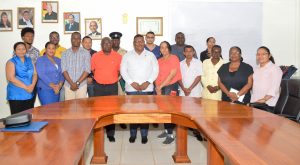…as Venezuelans continue to cross over
THE shortage of drugs and medical supplies, fuel smuggling, and violent threats are among the challenges facing Region One (Barima-Waini), as Venezuelans continue to cross over into Guyana.
This was expressed by Brethnol Ashley, Regional Chairman of Region One, during a recent meeting with his Region Four (Demerara-Mahaica) counterparts. Pauline Lucas, Region Four Regional Executive Officer, led a team to the Barima-Waini Region to discuss avenues for collaboration, amid the influx of Venezuelan migrants. It was during that meeting that Ashley reportedly complained about the region’s lack of human resources and the continuous shortage of drugs and medical supplies, as a result of the increased number of Venezuelans seeking medical attention there.
According to a press statement issued by the Region Four Regional Democratic Council (RDC) on Monday, January 28, 2019, Ashley expressed gratitude to the Region Four RDC for establishing the partnership, which would see the Region Four administration channelling some of its resources to help the people of Barima-Waini.
He said that taking into account the increased challenges and difficulties that officials within his region were forced to confront, the support being offered by the RDC Region Four’s health sector was greatly appreciated.
SECURITY PATROLS
The Region One RDC chairman also used the platform to appeal to the government to step up security patrol at the borders, explaining that of recent there have been increasing threats. These threats, he warned, should be taken seriously by the country’ security forces. He said that the government and residents must recognise that because of Venezuela’s grave economic and political crisis, desperation was evident. “We have heard that there is a plan to hijack the ferry and this resulted in the ferry having to be escorted into here a few weeks ago, because there were reports that the Sindicatos were planning an attack,” the regional chairman contended.
“For White Water there are 640 [residents], in the community of Imberto there are 74; there is also a new community on the radar called Black Water Barima with 40, Khan Hill has 101, Kamwatta has 65 while Yarakita has 64, so the numbers tell their own story that indeed there is an increase,” Ashley pointed out.
FUEL SALE

He contended that several of the Venezuelans were involved in the sale of illegal fuel – an act which was of major concern to the business community within the Kumaka area. He disclosed that the Kumaka community being a primary business hub will certainly will pose a number of problems. The RDC chairman stated that the RDC had constructed a living quarters for several of the migrants, and, with several activities taking pace there, both legal and illegal, he foresees various challenges there, adding that it would pose danger for not only the migrants but residents as well.
Just last week President David Granger called on the Guyana Defence Force (GDF) to remain vigilant to protect the country from present and future dangers. He made the call at the GDF Annual Officers’ Conference on January 24, 2019, at the Baridi Benab at State House, where he reminded those present that Guyana subscribes to peaceful settlement of disputes and will never do anything to endanger international peace.
In the last few days, Venezuela was plunged further into political crisis as its President Nicolas Maduro, broke off diplomatic ties with the United States, while several countries are now divided on their support of the socialist leader. Guyana, although concerned with Venezuela’s persistent territorial claim, continues to assist the Spanish-speaking migrants who have been fleeing the economic hardship in their country.
ILLEGAL ARMS
“Incursions have occurred not only in our maritime space but also on land. Illegal mining, illegal logging, illegal arms, narcotics, people and wildlife trafficking and the smuggling of precious minerals have continued. They have to stop,” the President insisted. “Citizens have been killed. Communities, particularly those in our frontier villages, must be made safe from transnational crime…the force therefore is obligated to secure the state and safeguard the entire territory from invasion, incursion and insurrection. Incursions must be deterred. Insurrections must be suppressed. The State must remain secure,” Granger, who is also the Commander-in-Chief of the armed forces, said.
JUNGLE PATROLS
To the attending officers, the President urged that ground forces to continue to conduct “long-range jungle patrols” to the farthest corners of the country. “The GDF was never intended to be a ‘coastal’ force; it is, and will remain, a comprehensive national force. It must reach every corner of the country and must be competent in conducting long-range patrols, in any weather or terrain, by day and night and for long periods. Officers and soldiers who cannot go on long-range patrols, in any weather or terrain by day or by night, for long periods, have no place in the defence force,” he said firmly.
As the GDF faces challenges such as a small-sized economy; porous borders and limited physical infrastructure, the President said that the government will continue to lend its assistance. Budgetary allocations to the GDF have increased by over 75 per cent from $8.0B in 2014 to G$14.02B in 2019. These funds will result in improvements to the force’s physical infrastructure; the acquisition of drones for border surveillance and additional in-shore patrol vessels, engineering and transport equipment.
Meanwhile, the President highlighted that in 2018, the Air Corps’ fleet was improved with the acquisition of light reconnaissance aircraft, while light transport aircraft are to be procured this year. In addition, the force’s technical corps is being improved; the Intelligence Corps and the Signal Corps have been reformed and the Engineer Corps has received equipment to enhance the force’s agility.


.jpg)











